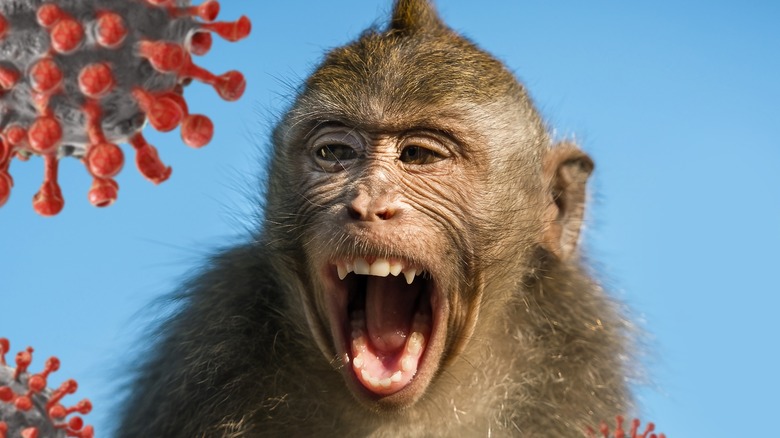Is There A Cure For Monkeypox?
Monkeypox is a zoonosis, which means it's a virus transmitted to humans from animals (per World Health Organization). It can then also be transmitted from an infected human to another human. Monkeypox spreads through contact with blood, bodily fluids, lesions, respiratory particles, or contact with recently contaminated objects. The result is a painful and itchy rash that may turn into blisters or scabs, as well as symptoms such as headaches, fever, fatigue, aches, and swollen lymph nodes.
Interestingly, monkeypox falls into the category of Orthopoxvirus, just like smallpox which also causes similar lesions and symptoms. The good news is that after being a problem for thousands of years, smallpox was eradicated in 1980 using vaccines (via Mayo Clinic). The vaccine can help people avoid smallpox or reduce its symptoms if they become infected. Today people don't usually come into contact with the virus, so smallpox vaccination is uncommon. If someone were infected with smallpox, there is also possible treatment using antiviral medications. Tecovirimat (TPOXX) and brincidofovir (Tembexa) have been found effective in lab tests and for treating animals and can be used to treat new cases of smallpox. Could these same medications or smallpox vaccines cure the current monkeypox surge?
A cure for monkeypox?
According to the Cleveland Clinic, symptoms usually go away on their own within two to four weeks when it comes to monkeypox. For now, only the symptoms and complications of monkeypox infections can be treated. There is no widely approved cure for monkeypox, but some are being tested and researched. Antiviral medicines TPOXX, Tembexa, cidofovir (Vistide), and intravenous vaccinia immune globulin (VIGIV) are all possible considerations for the treatment of monkeypox (per National Institute of Allergy and Infectious Diseases).
The Centers for Disease Control and Prevention (CDC) reports that TPOXX was approved in 2018 by the U.S. Food and Drug Administration for treating humans with smallpox but has not been approved for monkeypox. Since the viruses are similar, the CDC believes the treatment can work for both. Currently, TPOXX is only used for certain severe cases or those at high risk of complications with monkeypox, such as those with an impaired immune system. While this research and limited use are ongoing, TPOXX is still considered an investigational drug that may eventually be widely used.
Luckily though, the JYNNEOS vaccine has recently been approved to prevent both smallpox and monkeypox and is currently an effective defense against the viruses (per CDC). The vaccine requires two doses, and patients are fully vaccinated 14 days after being given the second dose. Cleveland Clinic also reports the best way to combat monkeypox is to avoid contact with infected humans, animals, and materials in order to stop its spread.


